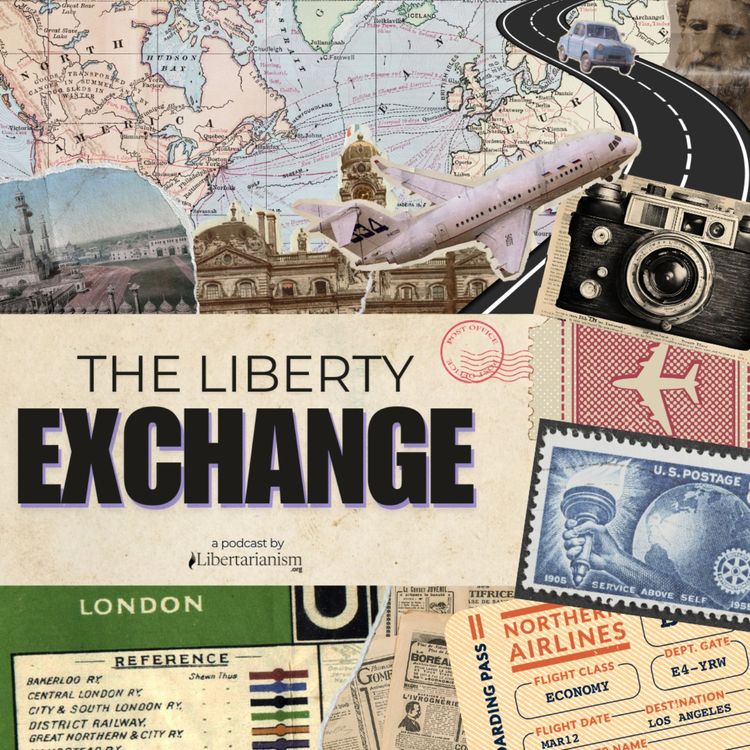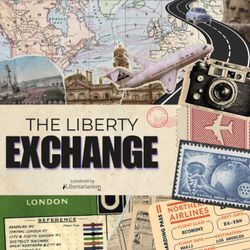Share

The Liberty Exchange
Liberty in our Lifetime: A Conversation with Jason Sorens
Ep. 10
•
In this episode, Jonathan Fortier talks with Jason Sorens, Senior Research Fellow at the American Institute of Economic Research and Founder of the Free State Project. They discuss the origins and purposes of the Free State Project, the question of secession, the lessons that other American states might learn from the FSP, analogues with other secessionist movements around the world, and then turn to a discussion of the Cato-supported publication, “Freedom in the 50 States.”
More episodes
View all episodes

24. David Beito on his book FDR: A New Political Life
51:15||Ep. 24In this episode, Jonathan Fortier talks with David Beito about FDR's rise to the American presidency, and the negative consequences for civil, political and economic liberty. The conversation explores the ways in which Roosevelt was influenced by Wilson, who had promulgated a new formulation of freedom, and Teddy Roosevelt, whose nationalism, coupled with the ideas imported from Bismarck's German thinkers, encouraged a strong movement toward centralization and an increase in federal power.
23. You Don’t Own Me: Individualism and the Culture of Liberty with guest Tim Sandefur
57:00||Ep. 23In this episode, Jonathan Fortier talks with Tim Sandefur about his recent book, You Don’t Own Me, published by Libertarianism.org in 2025. The conversation explores themes of liberty, individualism and personal autonomy as they find expression in novels, films, blues music and architecture, to name just a few of the genres up for discussion.Important note: Tim notes that it was Bernard Taupin, not Tim Rice, that wrote the lyrics for “Nikita”
22. Peak Human: Lessons from the Rise and Fall of Golden Ages with Johan Norberg
46:41||Ep. 22In this episode Jonathan Fortier talks with Johan Norberg about his new book Peak Human, which explores seven golden ages to reveal the common thread that makes societies thrive. Their conversation explores not only what went wrong when these civilizations collapsed, but the lessons to be learnt about what was done right. Openness, Norberg argues, has historically triumphed over withdrawal from the rest of the world.
21. I, Smartphone: The Power of the Free Market with Lawrence W. Reed
39:51||Ep. 21In this episode Jonathan Fortier talks with Lawrence Reed about his essay, "I, Smartphone", which revisits the themes of Leonard Read's famous essay, "I, Pencil" for contemporary audiences. Their conversation explores the incredible complexity and power of free markets and the foundational principles that allow those markets to function most successfully.
20. Talking Liberty and Milton Friedman: A Conversation with Brad Lips, CEO of Atlas Network
42:52||Ep. 20Jonathan Fortier talks with Brad Lips, CEO of Atlas Network, about a network of over 500 liberty-advancing think tanks around the world. Their conversation explores the necessity of decentralized knowledge and local efforts as essential elements in promoting free societies in different cultures with unique circumstances. Jonathan and Brad discuss the recent issue of the Atlas magazine, “Freedom’s Champion”, in which Brad celebrates the legacy of Milton Friedman, his close to connection to Atlas, and his many contributions to promoting liberty around the world.
19. The Capitalist Manifesto: A Conversation with Johan Norberg
49:10||Ep. 19Jonathan Fortier talks with Johan Norberg, author of The Capitalist Manifesto: Why the Global Free Market Will Save the World. The conversation explores how a simple coffee shop can illustrate the complexity of international trade, why capitalism is a "double thank you" system in which we may all get what we need more efficiently, and much more. Norberg delves into everyday examples that help us appreciate this economic system that has brought us unprecedented prosperity.
18. Modern Libertarianism: A Conversation with Brian Doherty
38:44||Ep. 18Jonathan Fortier talks with Brian Doherty, author of Modern Libertarianism: A Brief History of Classical Liberalism in the United States. The conversation explores some of the main themes in Doherty’s book, including figures like Mises and Hayek, Ayn Rand, Leonard E. Read and many others. Doherty muses on the nature of the libertarian movement and the many strains of thought animated by fractious individuals.
17. Open Borders: A Conversation about Immigration with Bryan Caplan
48:10||Ep. 17Jonathan Fortier and Bryan Caplan discuss the reissue of Open Borders a graphic non-fiction novel published by Libertarianism.org. Caplan argues for the tremendous power of open migration to unleash economic potential and generate much greater overall human flourishing. The episode explores some of the common objections to immigration, considering both the American and European context, and concludes with some speculation about how best to modify current regulation to facilitate the movement of people looking for opportunity in the United States.
16. The Freedom Convoy: The Case of the Canadian Truckers with Bruce Pardy
47:29||Ep. 16In this episode, Jonathan Fortier and Bruce Pardy discuss some of the ways that the government response to COVID (both in Canada and abroad) revealed the fragility of individual freedom in the face of political power and explore the various reasons that political, legal and civic institutions failed to protect individual liberty in a time of apparent crisis. The conversation explores aspects of the Canadian trucker protest as, in a sense, representative of the wider international and democratic opposition to authoritarian governments. Jonathan and Bruce conclude with some reflections on the centuries-long tendency to “move power around” from one place of authority to another, without questioning the legitimacy of exercising power over others. The conversation concludes with some thoughts about the administrative state, and the manner in which it stands in opposition to accountable government and a robust individual freedom.